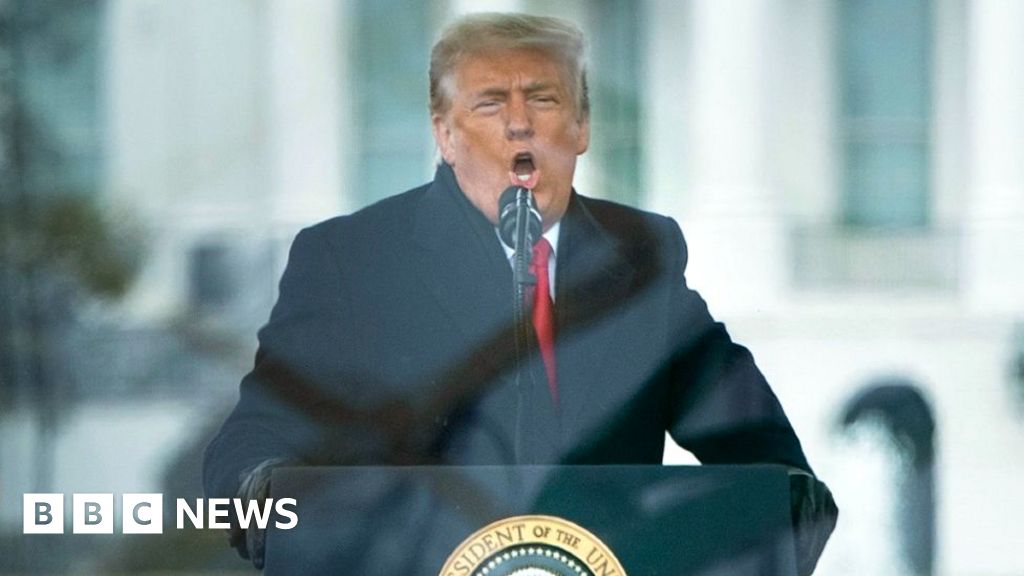has questions to answer over edited Trump speech, MPs say

```html BBC Faces Scrutiny Over Edited Trump Speech in Panorama Documentary The BBC is under intense scrutiny after a cross-party group of Members of Parliament (MPs) raised "serious questions" regarding a Panorama documentary that allegedly misled viewers by editing a speech made by former US President Donald Trump. The controversy stems from accusations that the program, titled "Trump: A Second Chance?", deceptively portrayed Trump's words to suggest he explicitly encouraged the Capitol Hill riots of January 2021.
MPs Demand Answers From BBC Chairman The House of Commons culture, media and sport committee, led by Caroline Dinenage, has formally written to BBC chairman Samir Shah, demanding an explanation of the actions being taken to address the concerns raised by an internal memo detailing the alleged editing. Dinenage emphasized the need for reassurance that the BBC's leadership is treating the matter with the utmost seriousness. "We need to be reassured that those at the very top of the BBC are treating these issues with the seriousness they deserve," she stated, adding that the committee is focused on ensuring the BBC upholds its reputation for integrity and public trust. A BBC spokesperson responded, stating, "While we don't comment on leaked documents, when the BBC receives feedback it takes it seriously and considers it carefully." Downing Street has confirmed that the Culture Secretary, Lisa Nandy, and senior officials at the Department for Culture, Media and Sport have been briefed on the memo and have received assurances from the BBC that the issues are being investigated.
Details of the Alleged Editing The controversy centers around Trump's speech in Washington D.C. on January 6, 2021, prior to the Capitol riots. In the original speech, Trump stated, "We're going to walk down to the Capitol, and we're going to cheer on our brave senators and congressmen and women." However, the Panorama documentary allegedly edited the speech to present Trump as saying: "We're going to walk down to the Capitol... and I'll be there with you. And we fight. We fight like hell." According to reports, the two segments of the speech that were spliced together were delivered more than 50 minutes apart. The "fight like hell" comment was reportedly taken from a section where Trump discussed alleged corruption in the US elections. Critics argue that this editing, combined with subsequent footage of protestors marching on the Capitol, created a false impression that Trump's supporters were acting directly upon a call to arms delivered at that specific moment.
Expert Analysis: The Importance of Context and Editorial Integrity Dr. Emily Carter, a Professor of Journalism Ethics at the University of Oxford, emphasized the importance of context in news reporting. "The power of editing lies in its ability to shape narratives," she explained. "While condensing information is often necessary, altering the chronological order of events or combining disparate statements can fundamentally change the meaning and potentially mislead the audience. In cases where accusations of bias are made, media outlets need to offer full transparency and a clear justification for their editorial choices."
Political Fallout and Calls for Accountability The alleged editing has triggered strong reactions from political figures. Conservative leader Kemi Badenoch described the edits as "absolutely shocking" and "fake news," calling for those responsible to be sacked. Former Prime Minister Boris Johnson also weighed in, questioning who at the BBC would take responsibility and resign. The Telegraph reported that the internal memo outlining concerns about BBC bias was authored by Michael Prescott, a former independent external advisor to the broadcaster's editorial guidelines and standards committee.
Wider Concerns: BBC Arabic Coverage Separately, Prescott has reportedly raised concerns about a lack of action regarding "systemic problems" of bias in BBC Arabic's coverage of the Israel-Gaza war. According to reports, BBC Arabic allegedly featured pro-Hamas and antisemitic commentators on air multiple times. Prescott's report purportedly found "stark differences" between BBC Arabic's coverage and that of the main BBC News website, suggesting a potential bias against Israel. The BBC has acknowledged past errors in BBC Arabic's coverage and stated that it has taken steps to improve its processes.
Historical Context: BBC's Commitment to Impartiality The BBC, established in 1922, has long been regarded as a cornerstone of British broadcasting and a global leader in news dissemination. Its Royal Charter mandates a commitment to impartiality, accuracy, and fairness. This commitment has been tested throughout its history, particularly during times of political upheaval and conflict. The current controversy underscores the ongoing challenges faced by news organizations in maintaining public trust in an increasingly polarized media landscape. The BBC's response to these allegations will be crucial in reaffirming its commitment to journalistic integrity.
The BBC's Response and Ongoing Investigation The BBC has stated that it is taking the concerns raised in the internal memo seriously and is examining the issues. The outcome of this investigation and the actions taken by the BBC in response will be closely watched, both within the UK and internationally, as they will have a significant impact on the corporation's reputation and its ability to maintain public trust. The incident highlights the critical importance of editorial rigor and transparency in maintaining the credibility of news organizations in the digital age. ```
Originally sourced from: BBC Entertainment
